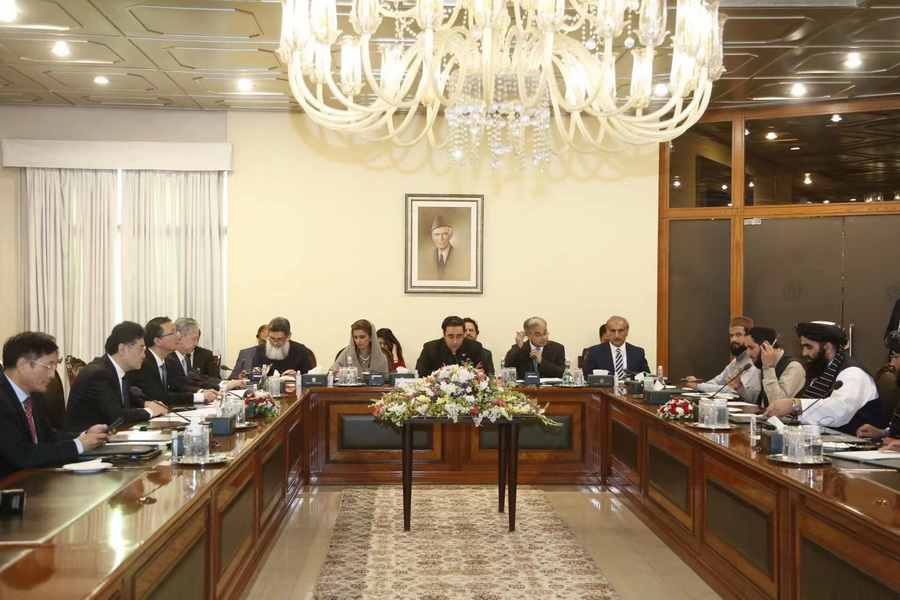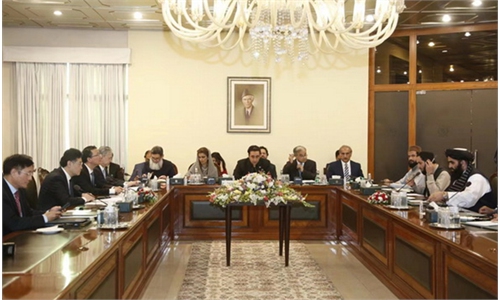
China-Afghanistan-Pakistan Foreign Ministers' Dialogue Photo: Chinese Foreign Ministry
Chinese State Councilor and Foreign Minister Qin Gang made his maiden visit to Pakistan from May 5 to 6. Besides meeting with the top officials of Pakistan, the visit covered an extensive agenda: During the visit, Qin attended the Fifth China-Afghanistan-Pakistan Foreign Minister's Dialogue in Islamabad on May 6.
This dialogue came at a crucial time as it followed the very important meeting of the Council of Foreign Ministers of the Shanghai Cooperation Organisation (SCO) that discussed the issue of terrorism and regional peace and security. Building on this momentum and the Chinese contribution to regional peace and security, this was the third important meeting on Afghanistan that Qin attended in less than a month, signifying the level of importance China is attaching to a peaceful and prosperous Afghanistan.
Last month, the Chinese foreign minister chaired the second informal meeting on Afghanistan between the Foreign Ministers of China, Russia, Pakistan, and Iran and attended the Fourth Foreign Ministers' Meeting among the Neighboring Countries of Afghanistan in Samarkand.
These meetings and efforts came as a result of the Global Security Initiative (GSI) proposed by President Xi Jinping. The world today is facing multiple risks and challenges which are unprecedented. The global security architecture is being depleted and has been in dire need of a security concept which is both practically applicable as well as acceptable to countries across the globe. While the major powers have largely resorted to coercion for conflict resolution, GSI presents a different and workable solution managed by a coordinated set of actions to address the security challenges confronting the globe today. The concept paper presented by FM Qin in February established China's vow for the promotion of security for all in the world by safeguarding global security architecture and adopting a unified approach to maintain global peace and order.
The GSI calls on countries to acknowledge the changing international landscape in the spirit of solidarity and "address the intertwined challenges of security with a win-win mindset." Ever since the launch of the GSI, China has increased its engagement toward achieving a peaceful neighborhood. The recent diplomatic breakthrough between Saudi Arabia and Iran with Chinese mediation has boosted the confidence of regional countries in seeing peace in the region, especially under China's lead. The non-interference policy of China and its principled position placing economic prosperity of the region and a unified approach for conflict resolution and peace promotion makes the Chinese approach different and welcoming to other countries.
China's position on Afghanistan is very clear. It welcomes Afghanistan's participation in BRI and aspires to convert Afghanistan from a "land-locked" to "land-linked" country through economic cooperation and regional integration. China's role in Afghanistan is beyond politics and adheres to "Three Respects" (independence, sovereignty, and territorial integrity) and "Three Nevers" (never interfering in internal affairs, seeking self-interest, and pursuing influence). Consistency and perseverance in terms of its outreach have defined the Chinese vision.
After the withdrawal of the US troops from Afghanistan, the engagement of the West in Afghanistan is limited to humanitarian assistance and is constantly engaging in coercive measures to deal with the interim Afghan government. On the other side, the Chinese approach is more inclusive and far-reaching. Driven by its empathetic understanding of global affairs, and looking at the changing landscape of Afghanistan with solidarity, Chinese policy on Afghanistan is a textbook interpretation of its GSI. China believes that supporting the interim Afghan government with efforts of reconstruction and development is important for building inclusive government within Afghanistan and friendly relations with neighboring countries and fighting terrorism.
It may be noted that the Afghan interim Foreign Minister received a travel ban exemption from UNSC to attend this meeting which entails how closely China is following its cooperation director under GSI by upholding United Nations' central role in security governance. It also discredits the erroneous conception of the West that China is striving to build an alternative "security architecture." If any the GSI places "non-interference in internal affairs" as the most important norm to reform the global security architecture contaminated by the West through its interference policies, disrespecting the territorial sovereignty and integrity of independent states, and native cultures.
This Tri-party dialogue was important to build up on the key meetings between the Foreign Ministers of neighboring countries of Afghanistan. Only time can tell but this Trilateral Foreign Ministers' Dialogue has the potential to build consensus, consolidate mutual trust, and jointly contribute to peace, stability, development, and prosperity in the region.
The author is an international expert on the Belt and Road Initiative (BRI), Afghanistan, South and Central Asia. opinion@globaltimes.com.cn


